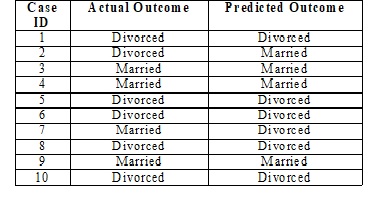Revolutionizing Divorce Case Prediction in India: A Machine Learning Approach to Save Marriages and Enhance Decision Accuracy
DOI:
https://doi.org/10.31033/ijemr.13.2.39Keywords:
Divorce Case Prediction, Machine Learning Algorithms, Revolutionizing Divorce, Marriage Counselling, Family LawAbstract
The rising number of divorce cases in India has raised concerns about the stability and well-being of marriages. Predicting divorce cases accurately can be critical in identifying potential risks and implementing timely interventions to save marriages. This study proposes a novel approach that uses machine learning algorithms to forecast divorce cases in India. The primary goal is to use advanced predictive models to improve decision accuracy and marriage preservation. To begin, the paper establishes the importance of accurate divorce case prediction by investigating the social, emotional, and economic consequences of divorce on individuals and society as a whole. An extensive review of existing literature is conducted, shedding light on the limitations of traditional divorce methods. The paper goes over the process of gathering detailed socio-demographic information, marriage history, and psychological factors from various sources. Preprocessing is performed on the collected dataset to address missing values, outliers, and ensure data integrity. To train predictive models, various machine learning algorithms such as logistic regression, support vector machines, random forests, and gradient boosting are investigated. To identify the most relevant predictors contributing to divorce cases, feature selection techniques are used. The accuracy, precision, recall, and F1-score of these models are used to evaluate their performance. In addition, the interpretability of machine learning models is investigated in order to gain insights into the underlying factors that lead to divorce [7]. This analysis contributes to a better understanding of the critical factors that influence marital outcomes and provides useful information for policymakers, counsellors, and individuals looking to strengthen their marriages. The proposed machine learning approach's ethical considerations and potential implications in the legal and counselling domains are thoroughly discussed. Concerns about privacy, fairness, and transparency are addressed in order to ensure responsible and accountable predictive model deployment in the divorce case prediction process. The study demonstrates how machine learning has the potential to revolutionise divorce case prediction in India. This approach can facilitate timely interventions, counselling, and support systems to preserve marriages and foster marital harmony by accurately identifying marriages at risk. This study's findings contribute to the burgeoning field of automatic court decision prediction and provide actionable insights for stakeholders involved in marriage counselling and family law in India [4].
Downloads

Downloads
Published
How to Cite
Issue
Section
License
Copyright (c) 2023 Prithviraj Singh Solanki, Yamini Kunwar Solanki

This work is licensed under a Creative Commons Attribution 4.0 International License.











